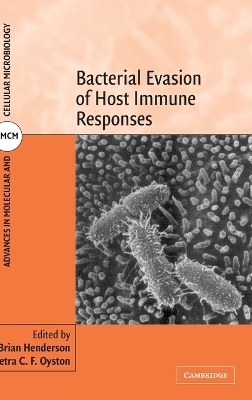
Bacterial Evasion of Host Immune Responses
Cambridge University Press (Verlag)
978-0-521-80173-7 (ISBN)
Our survival as multicellular organisms requires the constant surveillance of our internal and external (mucosal) environments by the multifarious elements of the innate and acquired systems of immunity. The objective of this surveillance, expensive as it is to the organisms, is to recognise and kill invading microorganisms. Over the past fifty years the cells and mediators involved in our immune defences have been painstakingly identified. However, it is only relatively recently that the ability of microorganisms to evade immunity has been recognised and investigated. Bacterial Evasion of Host Immune Responses introduces the reader to the mechanisms used by bacteria to evade both humoral and cellular immune responses, using systems ranging in complexity from the simple quorum sensing molecules - acyl homoserine lactones - to the supramolecular syringe-like devices of type III secretion systems. This book will be of interest to researchers and graduate students in microbiology, immunology, pharmacology and molecular medicine.
Preface; Part I. Recognition of Bacteria: 1. The dendritic cell in bacterial infection: sentinel or Trojan horse? Benjamin M. Chain; 2. CD1 and non-peptide recognition systems in microbial immunity Kayvan R. Niazi, Steven A. Porcelli and Robert L. Modlin; 3. The NRAMP family: co-evolution of a host/pathogen defence system Richard Bellamy; Part II. Evasion of Humoral Immunity: 4. Evasion of complement pathways by bacteria Michael A. Kerr and Brian Henderson; 5. Bacterial immunoglobulin-evading mechanisms: Ig degradation and Ig-binding proteins Mogens Killian; 6. Evasion of antibody responses: bacterial phase variation Nigel J. Saunders; Part III. Evasion of Cellular Immunity: 7. Type III protein secretion and resistance to phagocytosis Ake Forsberg, Roland Rosqvist and Maria Fallman; 8. Bacterial superantigens and immune evasion John Fraser, Thomas Proft, Vickery Arcus and Edward Baker; 9. Density-dependent bacterial signalling molecules as immune modulators David Pritchard, Doreen Hooi, Eleanor Watson, Sek Chow, Gary Telford, Barrie Bycroft, Siri Ram Chhabra, Christopher Harty, Miguel Camara, Stephen Diggle and Paul Williams; 10. Microbial modulation of cytokine networks B. Henderson and Rob M. Seymour; 11. Enterotoxins: adjuvants and immune inhibitors Jan-Michael Klapproth and Michael S. Donnenberg; 12. Type III protein secretion and inhibition of NF-κB Klaus Ruckdeschel, Bruno Rouot and Jürgen Heesemann.
| Erscheint lt. Verlag | 28.4.2003 |
|---|---|
| Reihe/Serie | Advances in Molecular and Cellular Microbiology |
| Zusatzinfo | 12 Tables, unspecified; 9 Plates, color; 1 Halftones, unspecified; 23 Line drawings, unspecified |
| Verlagsort | Cambridge |
| Sprache | englisch |
| Maße | 159 x 237 mm |
| Gewicht | 723 g |
| Themenwelt | Medizin / Pharmazie ► Medizinische Fachgebiete ► Mikrobiologie / Infektologie / Reisemedizin |
| Studium ► Querschnittsbereiche ► Infektiologie / Immunologie | |
| Naturwissenschaften ► Biologie ► Biochemie | |
| Naturwissenschaften ► Biologie ► Mikrobiologie / Immunologie | |
| ISBN-10 | 0-521-80173-7 / 0521801737 |
| ISBN-13 | 978-0-521-80173-7 / 9780521801737 |
| Zustand | Neuware |
| Haben Sie eine Frage zum Produkt? |
aus dem Bereich


